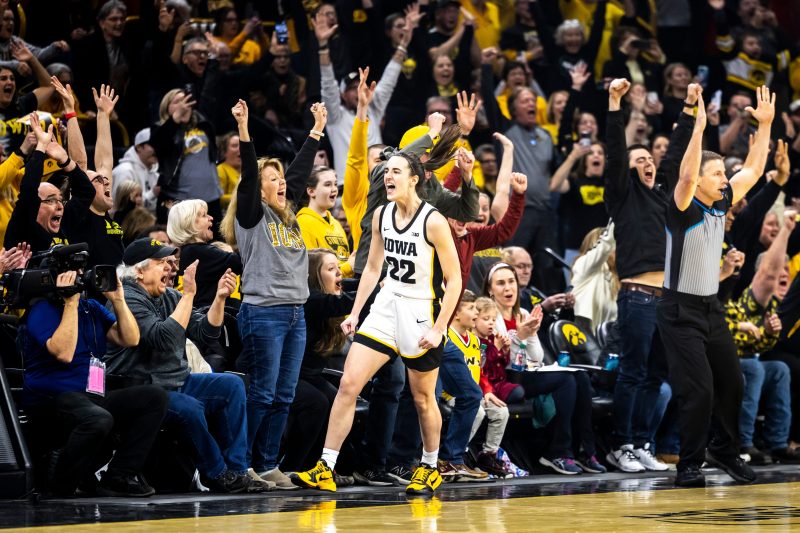During her assault on the record books, Caitlin Clark has drawn no shortage of comparisons.
Her prolific scoring and flair are reminiscent of ‘Pistol Pete’ Maravich — so much so, one of her nicknames is Ponytail Pete. Her ridiculous ability to hit from anywhere, at any time, is Steph Curry-esque. And her late-game daggers, and the trash-talking that follows, is vintage Diana Taurasi. Hilariously so.
But these comparisons, all of which are valid, also fall short. Because Clark is more than just her game. When you factor in the outsized impact she’s having off the court, there’s really been only one other player like her:
Michael Jordan.
Jordan wasn’t just the best player in the history of the game — don’t at me, LeBron fans — he transcended sport. His and all others. He was a cultural sensation, and he elevated the NBA because of it.
Sure, Magic Johnson and Larry Bird’s rivalry had rescued the NBA from the dark days of the ‘80s, when drug use among players was prevalent and games weren’t even shown live on TV. Even some playoff games were still getting the tape-delay treatment in 1986.
But it was Jordan who made the league, and those playing in it, a global phenomenon.
Even if you didn’t like the NBA, or care about any sports, you knew who Michael Jordan was. His jersey was ubiquitous in the ’90s, his shoes and commercials even more so, and kids across the country flocked to courts in hopes they, too, could ‘be like Mike.’ Jordan was so enmeshed in the cultural fabric of our society that he became a de facto member of every American household.
It wasn’t just in the United States, either. Jordan had already won two NBA titles when he and the Dream Team played at the Barcelona Olympics, and even the possibility of catching a glimpse of ‘MJ’ in a hotel lobby or getting on a bus was enough to draw throngs of fans. Even those who didn’t see him in person were inspired to buy the products he pitched or take up the game — future Hall of Famers included.
Clark’s impact might not be as widespread — yet — but it’s no less transformative.
Interest in women’s sports has skyrocketed over the last few years. Viewership during last year’s NCAA basketball tournament obliterated the previous high, with the final between Clark’s Iowa team and LSU alone watched by almost 10 million people.
Franchise values in the NWSL and WNBA are rising, as are TV ratings for both leagues. The NCAA just inked a deal with ESPN that values the women’s basketball tournament at $65 million a year while the NWSL reached a four-year, $240 million deal for its media rights. Nike values Sabrina Ionescu enough to give her her own shoe while Puma gave two-time WNBA MVP Breanna Stewart a signature sneaker, too.
But much like Jordan did, Clark is taking this increased interest and adding rocket fuel to it.
Every game she plays, home and away, is in front of a sold-out crowd. Tickets for Thursday night’s game, when she broke the record a little more than 2 minutes into the first quarter, were the second-highest in history, with courtside seats going for more than $3,100 each. Little boys and girls clamor for her jersey, and fans line up hours before games begin in hopes of putting themselves in position to catch her eye as she enters and exits the court for warmups or, even better, get an autograph.
‘It’s really humbling,’ Clark’s dad, Brent, said in an interview during Fox’s national broadcast of Iowa’s game against Nebraska on Sunday. ‘This is what it should be like for every sports event. Women’s basketball is awesome.’
And thanks to his daughter, more people know that.
As Clark got closer and closer to the all-time NCAA women’s scoring record, it wasn’t only women’s basketball fans paying attention. Or people in Iowa. Her games are now shown at sports bars around the country, and it’s both men and women watching or pausing to check out the scores.
NBA stars routinely took to social media to praise her. Even Patrick Mahomes weighed in, calling her ‘one of the best college basketball players to ever play.’
Iowa’s game last Thursday against Penn State drew 612,000 viewers on the Big Ten network, its record for a women’s sporting event. Fox put Iowa’s game Sunday against Nebraska on national TV and was rewarded with 1.8 million viewers, a record for that network.
And just as Jordan was once a familiar sight in every American’s living room, it’s becoming impossible to watch any sporting event, heck any show, without seeing Clark in a State Farm commercial. She also has a deal with Nike and, if the manufacturer is smart, it’ll give her her own shoe and give it the Jordan treatment.
The interest in Clark isn’t likely to tail off now that she’s topped Kelsey Plum. Maravich’s all-time scoring record is still out there. So, too, is her professional career, whether that begins in the coming WNBA season or the next.
But the beauty of the spotlight on Clark is, like Jordan’s, it shines on others, too. Those who tuned in to Sunday’s game against Nebraska expecting to see Clark break the record instead saw a tight, compelling game featuring plenty of athleticism, hustle and, yes, some trash-talking. Casual basketball fans might not have known Jaz Shelley’s name before Sunday, but they sure do now.
And on it goes. Like Jordan, Clark will be the gateway to the game for many, but they will soon find their interest growing beyond her. Just as the NBA looked different before Jordan and after, so, too, will women’s sports because of Clark.
Follow USA TODAY Sports columnist Nancy Armour on social media @nrarmour.
